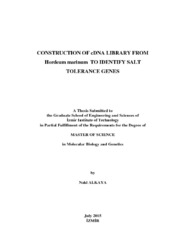Please use this identifier to cite or link to this item:
https://hdl.handle.net/11147/4334| Title: | Construction of Cdna Library From Hordeum Marinum To Indentify Salt Tolerance Genes | Other Titles: | Tuz Tolerans Genlerinin Belirlenmesi için Hordeum Marinumdan Cdna Kütüphanesi Oluşturulması | Authors: | Alkaya, Naki | Advisors: | Karakaya, Hüseyin Çağlar | Keywords: | Hordeum marinum Bipolaris oryzae |
Publisher: | Izmir Institute of Technology | Source: | Alkaya, N. (2015). Construction of cDNA library from Hordeum marinum to indentify salt tolerance genes. Unpublished master's thesis, İzmir Institute of Technology, İzmir, Turkey | Abstract: | Salt is necessary for plants because of ion homeostasis; however, excess uptake of salt leads to damage in plant cells, which may even result in the death of the plant. Hordeum marinum, also known as sea barley, is a member of Poaceae family that resides in coastal areas, so it is thought that it may have a possible salt tolerance gene or genes. Therefore, this study aims to identify the genes involved in salt tolerance in Hordeum marinum by functional genomics method. After screening, seven transformant yeast colonies found and sequence analyses of these plasmids gave homology to hypothetical protein of Bipolaris oryzae. To confirm salt tolerance of this protein, salt sensitive yeast cell transfected by this candidate gene was checked in high salt concentration containing medium. Based on solid growth assay, these transgenic yeast cells could survive in 1M saline medium. Hence, it is hypothesized that Hordeum marinum and Bipolaris oryzae might have a symbiotic association. It is possible that in this association Bipolaris oryzae may play a role as endophytic fungus that might also confer salt tolerance in Hordeum marinum. Tuz bitkilerde iyon dengesi için gerekli olup; aşırı alındığında bitkiye zarar veren hatta bitkinin ölümüne bile yol açabilecektir. Deniz arpası olarak bilinen Hordeum marinum, Poaceae ailesinin bir üyesi olup sahil bölgelerinde yaşabilmektedir. Taşıdığı bu özellikten, potansiyel olarak tuza tolerans genlerine sahip olabileceği düşünülmektedir. Bu tez çalışmasında, Hordeum marinumda tuz tolerasında rol oynayan genleri ortaya çıkarmayı, bunu da bitkinin cDNA kütüphanesini maya hücrelerinde tarayarak gerçekleştirmesi amaçlanmıştır. Tarama sonucunda, yedi maya kolonisi tespit edildi. Sekans sonuçlarına göre bitkiye tuz toleransını sağlayan gen, Bipolaris oryzae adlı fungus ile homoloji gösterdi. Sonraki aşamada, aday genle transfekte olmuş tuza hassas maya hücreleri yine yüksek tuzlu ortamda kontrol edildi. Kontrol sonucunda, bu hücreler 1Molarlık tuzlu ortamda yaşayabildi. Bu sonuçların ışığında, Hordeum marinum ile Bipolaris oryzae’nin simbiyotik bir birliktelik kurarak tuz toleransı sağladığı düşünülmektedir. |
Description: | Thesis (Master)--Izmir Institute of Technology, Molecular Biology and Genetics, Izmir, 2015 Includes bibliographical references (leaves: 27-30) Text in English; Abstract: Turkish and English ix, 30 leaves |
URI: | http://hdl.handle.net/11147/4334 |
| Appears in Collections: | Master Degree / Yüksek Lisans Tezleri |
Files in This Item:
| File | Description | Size | Format | |
|---|---|---|---|---|
| T001351.pdf | MasterThesis | 1.07 MB | Adobe PDF |  View/Open |
CORE Recommender
Page view(s)
716
checked on Apr 28, 2025
Download(s)
218
checked on Apr 28, 2025
Google ScholarTM
Check
Items in GCRIS Repository are protected by copyright, with all rights reserved, unless otherwise indicated.